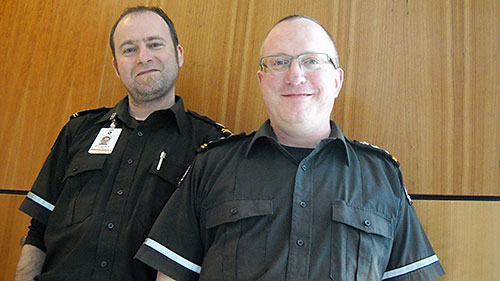
One morning in February 2003, Ze’ev Gedalof was working on the secluded coast of Naikoon Provincial Park in British Columbia’s Haida Gwaii archipelago.
A post-doc geographer at the University of Victoria at the time, he and an undergraduate student had driven out on an all-terrain vehicle to study dunes and sediments.
Now on foot, they were skirting driftwood piled on the beach when the student cried out. While attempting to move a log, his leg became pinned beneath it. Now he was alternately screaming in pain and being inundated by waves rushing up the beach.
Gedalof tried lifting the log but it was too heavy to move. With cupped hands, he scooped away sand from around the wood, but the waves just washed in more sediment.
Trying again, he hoisted the log just enough to allow the student to drag himself free. “It was an Incredible Hulk moment, where you find strength you didn’t think you had,” says Gedalof, now a professor in U of G’s Department of Geography.
He dragged the student out of the surf and back to their vehicle. After splinting the leg — clearly broken in more than one place — he phoned for emergency services to meet them and to alert the island hospital.
It took an hour to drive the ATV back out to the road. “I drove out as slowly as I could, but every time I hit a bump, he was screaming in pain. I was telling him jokes to keep him from going into shock.”
The student was taken by ambulance to the local hospital and then flown to Nanaimo for treatment, where he recovered.
For his fieldwork, Gedalof had already taken training in wilderness first aid. But it was on that day that he decided to pursue additional emergency training.
Arriving at U of G later that year, he joined the Guelph unit of St. John Ambulance. That’s where he trained to become an advanced medical first responder.
Since that memorable day more than a decade ago, he hasn’t needed to use that training in the field. But you never know, he says.
Meanwhile, he’s keeping in practice by volunteering at local events with St. John Ambulance. He’s not the only U of G faculty member to volunteer with the unit.
The unit chief is Prof. Jon Warland, School of Environmental Sciences. He oversees operation of the division and its roughly 60 volunteers. They attend community events in Guelph and sometimes further afield, primed to provide emergency medical services as first responders.
Those volunteers log a total of more than 3,500 hours of community service each year and about twice that much time in training and administration. Gedalof does an average of about 200 volunteer hours, including training, in a year.
In 2014, the unit covered about 250 events. Under a contract with the city, St. John Ambulance covers all public events at the River Run Centre. Volunteers are also on hand at area festivals, sporting events, company picnics and other gatherings.
Sometimes Guelph volunteers help out at events out of town. Gedalof treated someone at last year’s Pride Parade in Toronto and expects to work at this year’s Pan Am Games.
First responders free up full-time paramedics from having to put in mostly inactive hours at large gatherings. Those paramedics are called in for services not provided by first responders, including administering drugs and intubating patients.
Warland, an expert in micrometeorology, was also motivated to join after witnessing a near mishap with a colleague in the field. In 2008, he was part of a team that treated a marathon runner who suffered a heart attack near the finish line.
Music also brings both professors together after hours. They play in a band alongside geography professor Richard Kuhn and Jennifer Beehler, a staffer in the department.